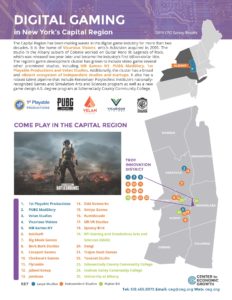Capital Region’s Game Development Cluster Is Growing
Large studio employment up 5.6%,
Strong demand among independent studios for game development incubator/game space
ALBANY, NEW YORK – Large employers within the Capital Region’s video game development cluster have added 5.6 percent more jobs over the past year, and they are all poised to continue growing, according to a Center for Economic Growth (CEG) survey conducted in February. On top of revealing the growth of the cluster’s large studios (>15 employees), CEG’s follow-up survey to the one it conducted in February 2018 found a significantly larger ecosystem of independent studios.
Twenty-one studios participated in this year’s Capital Regional Game Development Cluster Survey, with five being categorized as large studios and 16 as indie studios. Together they had 418 workers, with large studios employing 340, or about four-fifths of them. Including employees, contractors and volunteers, the indie studios had 78 workers. Last year’s survey included only nine indie studios.
Survey Overview
Cluster Profile:
- 21 studios surveyed
- 5 Large studios (>15 employees)
- 16 Independent studios (<15 employees, contractors, volunteers)
- 418 Workers total
- Large studio employment up 5.6% to 339 (Feb. 2018 to Feb. 2019)
Key Findings
- There is a need to develop and grow the cluster to enhance its ability to attract talent and studios.
- 2 large studios citing lack of startup support as an impediment to growth
- 2 large studios citing small employment base as an impediment to growth
- There is a need among large studios for competitive tax structure and incentives for production.
- 2 large studios citing New York’s lack of a video game tax credit as an impediment to growth
- 2 large studios cited New York’s high cost base as an impediment to growth.
- There is a need among indie studios for game design-specific incubator space.
- 11 indie studios expressed interest in locating to a game development incubator.
- There is a need among indie studios for improved access to funding, especially for hiring employees.
- 6 indie studios cited a need for improved access to funding.
“The Capital Region’s game development cluster continues to gain momentum. To sustain and accelerate that momentum, it is crucial for us to create a critical mass of sizeable studios that can help talent ride out the ups and downs inherent to the game development industry. To get there – and we are not far from it – we need to nurture our startups and attract more studios to the region. CEG is working with our partners on both fronts,” said CEG President and CEO Andrew Kennedy.
CEG will be promoting the findings of its 2019 Capital Region Game Development Cluster Survey later this month at the Game Developers Conference in San Francisco and PAX East in Boston as well as in November at the Montreal International Gaming Summit. Several of the region’s studios will also be showcasing their games at HV Gamer Con Expo, which coincides with the Northeast’s largest collegiate esports event, at the Albany Capital Center on March 30 and 31.
Large Studios
Expansion of the cluster is a major concern for the region’s large studios, with four out of five of them identifying its small employment base and/or lack of game design-specific incubator space as impediments to growth. That made the cluster’s size an issue as pressing, if not moreso, than New York’s lack of a defined game development incentive package and high cost base, relative to competitor states or provinces (e.g., Texas, Florida, and Montreal).
Despite these challenges, all of the region’s large studios reported hiring plans over the next 12 months. Experienced engineers and artists/animators remained in high demand. Large studios’ most-cited method for finding workers to fill these positions was college-based recruiting, especially at Rensselaer Polytechnic Institute (RPI), Rochester Institute (RIT) of Technology and Champlain College. The next most popular talent attraction methods equally cited by large studios included online job platforms, recruiters, employee referrals and industry events.
Indie Studios
Several of the region’s indie studios will launch their first games in 2019. Examples include “Doggo Unleashed” by Bork Bork Studios in Troy and “Ding Dong Ditch” by Spoony Bird, also in Troy. Half of the 16 indie studios reported plans to hire more employees or contractors over the next 12 months, though just as many identified improved access to funding, especially for employees, as the most needed regional investment for the cluster.
The studios face an overwhelming need to increase their visibility, with 11 citing digital marketing (e.g., social media, search engine optimization) as their most pressing marketing need. Their most pressing talent need was for artists or animators (8), followed by developers (6). Several indie studios, such as Dang!, Tunacat Studio, and Trojan Duck Games, have roots at Rensselaer Polytechnic Institute, whose Games and Simulation Arts and Sciences program ranked as the ninth best game design school in the country.
Incubator/Game Space
Half (8) of the indie studios surveyed are home operations, with the others being based in dedicated offices (5) or co-working spaces (3). Affordable working space is second to funding access as the most needed regional investment for the cluster identified by indie studios. Although RPI is home to one of New York’s three Digital Gaming Hubs, and the Tech Valley Center of Gravity serves as a popular meeting space for game developers, the Capital Region lacks an incubator dedicated to the game development cluster. Eleven indie studios expressed an interest in locating their operations to either an incubator dedicated to game development or a game space where game developers or artists could live with and work beside their professional peers.
For additional information or to talk to CEG President and CEO Andrew Kennedy, please contact CEG Director of Research and Communications James Schlett at 518-465-8975 X221 or jamess@ceg.org.















